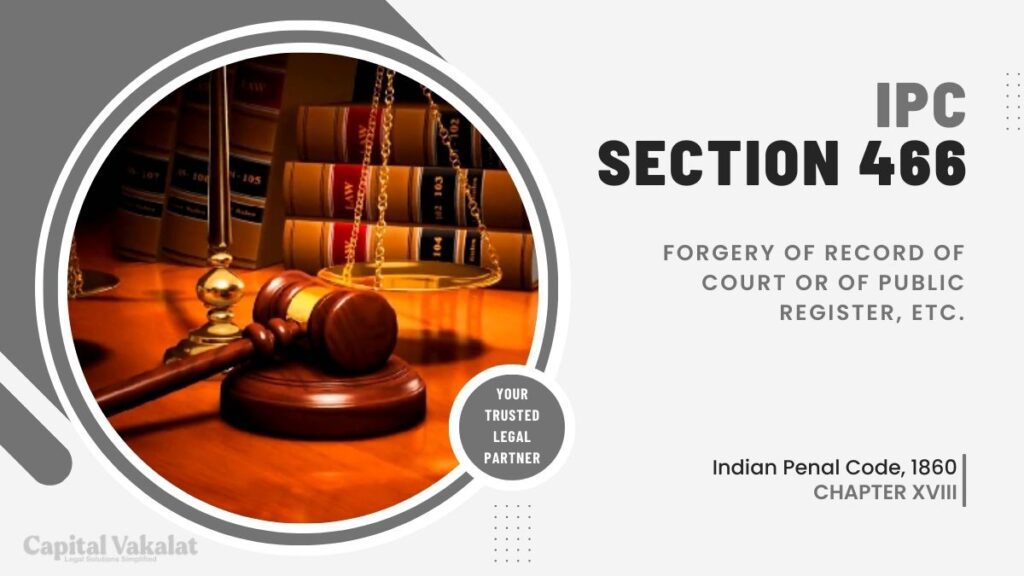Forgery, a deceitful act that undermines the very foundation of trust in legal proceedings, is a serious offense addressed by various legal provisions worldwide. In the context of Indian law, Section 466 of the Indian Penal Code (IPC) specifically deals with the forgery of records of court or public registers. This article explores the intricacies of Section 466 IPC, shedding light on its definitions, historical evolution, methods, legal consequences, and the impact on the justice system.

Forgery, especially when it involves court records or public registers, poses a significant threat to the integrity of the legal system. Section 466 IPC serves as a deterrent against such acts, emphasizing the importance of preserving the sanctity of documents that hold pivotal roles in legal proceedings.
Understanding Section 466 IPC
In essence, Section 466 IPC addresses the act of forging records related to the court or public registers. This includes a wide array of documents such as decrees, judgments, notices, summons, and any other document produced or received by a public servant.
Elements of Forgery
The core elements of forgery under Section 466 involve an intent to deceive and manipulate the course of justice. Understanding the purpose behind forging court records is crucial in comprehending the severity of the offense. Violation of Section 466 IPC can lead to severe consequences, ranging from fines to imprisonment.
Historical Perspective
To appreciate the gravity of forgery laws in India, it is essential to delve into the historical context. Over the years, the legal system has evolved to address the growing challenges posed by forgery. Landmark cases have played a pivotal role in shaping and refining the laws related to forgery of court records.
Methods of Forgery
Forgery is not a static crime; it adapts to advancements in technology. While traditional methods like signature forgery and document tampering persist, modern techniques involving digital manipulation have become prevalent. Understanding these methods is crucial for developing effective prevention and detection strategies.
Prevention and Detection
Authorities employ various measures to prevent forgery, ranging from secure document handling to the use of advanced technology. Forensic tools play a crucial role in detecting forged records, ensuring that the legal system can distinguish between authentic and manipulated documents.
Legal Consequences
The penalties for violating Section 466 IPC are stringent, reflecting the seriousness of the offense. Individuals found guilty of forging court records face legal proceedings and trials, with the outcomes varying based on the severity of the forgery.
Challenges in Prosecution
Despite the legal framework in place, prosecuting forgery cases presents unique challenges. Loopholes in the existing laws and the evolving nature of forgery methods contribute to the difficulties faced by the legal system in ensuring justice.
Impact on Justice System
Forgery of court records has far-reaching consequences, affecting the credibility of the justice system. Real-world examples highlight the potential repercussions of forged documents, emphasizing the need for a robust legal framework to combat such crimes.
Conclusion
In conclusion, Section 466 IPC plays a pivotal role in deterring and penalizing the forgery of court records and public registers. The legal system’s ability to adapt to evolving methods of forgery is essential to maintaining the public’s trust in the justice system. Stringent enforcement of laws, coupled with advancements in technology and forensic tools, is crucial in combating this deceitful act.
Frequently Asked Questions
What are the legal consequences of forging court records?
The legal consequences of forging court records include fines and imprisonment, with severity depending on the nature and extent of the forgery.
How has technology impacted the methods of forgery?
Technology has introduced new methods of forgery, including digital manipulation. Understanding these techniques is crucial for effective prevention and detection.
What measures are in place to prevent forgery of court records?
Authorities implement measures such as secure document handling and the use of advanced technology to prevent forgery.
What challenges does the legal system face in prosecuting forgery cases?
Challenges include loopholes in existing laws and the evolving nature of forgery methods, making prosecution complex and demanding.